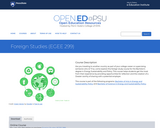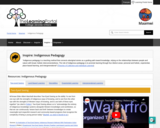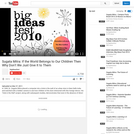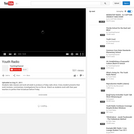
An overview of the NCOBS Educators Program.
- Subject:
- Education
- Material Type:
- Activity/Lab
- Date Added:
- 09/19/2016

An overview of the NCOBS Educators Program.

Experiential learning, yes! But...online? at a distance? independent undergraduate research? This capstone course in Energy and Sustainability Policy is a novel approach to exactly this. Each student follows the same overarching structure: a four-part written research report, weekly journals, group discussions, a LinkedIn presence, an in-person presentation and a video submission. Along the way, the student has numerous personal interactions with real world stakeholders and gives an in-person presentation to an interested local audience. Proven over many semesters now, this engaged scholarship model serves senior students well, guiding and building confidence and professional opportunities.

Are you traveling to another country as part of your college career or supervising someone who is? If so, come explore this foreign study course for the Bachelor's degree in Energy Sustainability and Policy. This course helps students get the most from their experience by providing opportunities for reflection and the creation of a Dossier worthy of sharing with a potential employer.

"Indigenous pedagogy is a teaching method that connects aboriginal stories as a guiding path toward knowledge, relying on the relationships between people and nature with broad, holistic interconnectedness. The role of Indigenous pedagogy is to promote learning through four distinct areas: personal and holistic, experiential, place-based learning, and intergenerational". (from Theories of Collective and Individual Learning, https://ecampusontario.pressbooks.pub/ticl/chapter/9-1-defining-indigenous-pedagogy/).
This is part of the Maamwi Hub's Discover Section, where you can find information and resources on Indigenous Peoples’ history, cultures, and perspectives, with a focus on the territory currently referred to as Ontario. Explore the entire Maamwi Hub by visiting the Provider Set linked below.

Hearts of Men have been running community-based mentoring programmes, bringing older and younger men together in support circles in the Western Cape from 2001 to 2021. The approach and the materials included in this manual have been tried and tested in many different communities, working with diverse groups of men/young men, aged between 15 and 70 years. SIx experiential training courses for men and young men are covered in Parts One and Two of this manual. For more background information on Hearts of Men, and a detailed description of our work, please refer to our book In the Hearts of Men (published in 2015). Details are given at the end of this manual.

Hearts of Men have been running community-based mentoring programmes, bringing older and younger men together in support circles in the Western Cape from 2001 to 2021. The approach and the materials included in this manual have been tried and tested in many different communities, working with diverse groups of men/young men, aged between 15 and 70 years. SIx experiential training courses for men and young men are covered in Parts One and Two of this manual. For more background information on Hearts of Men, and a detailed description of our work, please refer to our book In the Hearts of Men (published in 2015). Details are given at the end of this manual.

Play is something that every child enjoys doing. Since this is the case why not use play as a tool for education? Playing with the intent to learn is a great way to keep students interested and motivated in the lessons. This OER talks about different aspects of using play as a learning tool and why it is beneficial for all students.

This is a first course in project management, one in which students will learn the knowledge, skills, and abilities necessary to be an effective project manager. They will learn how to plan, execute, and monitor a project. The course will cover the latest theories and concepts on scoping, stakeholder management, team leadership, budgeting and contracting, scheduling, quality control and assurance, and risk management. Students will have the option to apply their learning to a real-world project.


This learning module (Lesson 3 of Unit 1) is part of a course called Project Management Fundamentals and may either be completed individually as a stand-alone topic, or part of a trio of introductory learning modules, or as part of the course.This learning module consists of an experiential exercise called the Rock'n Bands game by Klassen & Willoughby (2003) where students engage in a simulated project management exercise.

In 1999, Dr. Sugatra Mitra placed a computer into a hole in the wall of an urban slum in New Delhi India and watched with a hidden camera to see how children of the slum interacted with this foreign device. His "Hole in the Wall" project, along with subsequent studies, demonstrates that even in the absence of direct input from a teacher, an environment that stimulates curiosity can cause learning through self-instruction and peer-shared knowledge.

The Wild at Heart Adventure forms part of The Manhood Experience which consists of six experiential training courses. It is the third course in this series and follows In the Heart of a Man (Part one) and Reclaiming Manhood (Part two). The Wild at Heart Adventure (Part three). In this manual we include only the course content. Please refer to all the introductory comments, preparation notes, debriefing and follow through processes, team building, logistical details, safety procedures, and comments on the use of this material given in the accompanying The Manhood Experience training manual (Part one, course three). This information forms a vital part in the delivery of this course and is not repeated here.

Students take classes and work all week to produce a Friday radio show that goes live on air. Every student presents their weeks work (reviews, commentary, investigations) on air. Watch as students work with their peer teachers to perfect their work before Friday.